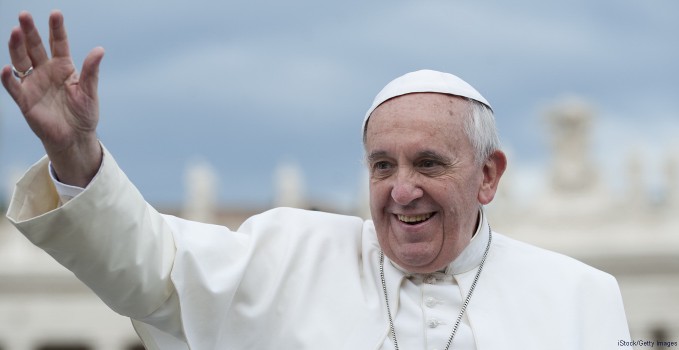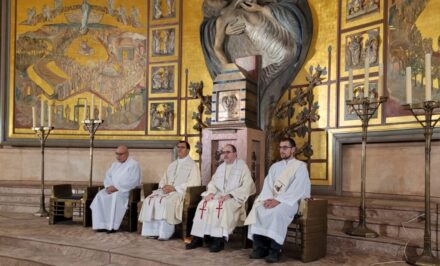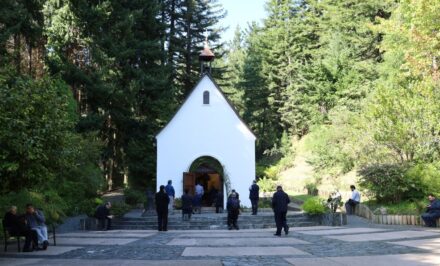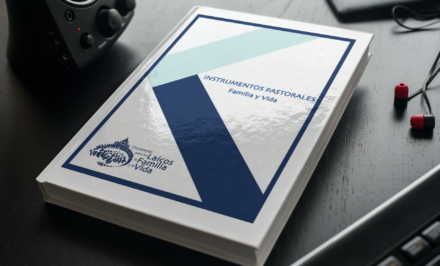FRANCIS IN ROME •
In the sweltering Roman summer, under the hot midday sun on 26 July 2015, Pope Francis reflected on the Gospel of the multiplication of the loaves in front of thousands of pilgrims who, despite the intense heat, gathered in St. Peters Square to hear him and receive his blessing. “To receive Communion means to draw from Christ the grace which enables us to share with others all we are and all we have,” he said.
These echo his words during his visit to Bañado Norte in Paraguay:
“A faith which does not draw us into solidarity is a faith which is dead, it is deceitful. “No, I am a very Catholic man; I am a very Catholic woman, and I go to Mass every Sunday”. But I ask you this, “what is going on in Bañados?”. You reply, “Oh I don’t know, I know that there are people there, but I don’t know…”. No matter how many Sunday Masses, if your heart does not reach out to others, if you do not know what is happening to your people, your faith is weak, unhealthy, or dead. It is a faith without Christ; faith without solidarity is faith without Christ, it is faith without God, faith without brothers and sisters.”
Text of Pope Francis’ words before praying the Angelus:
Dear Brothers and Sisters, Good morning.
This Sunday’s Gospel presents the great sign of the multiplication of the loaves, in the account of John the Evangelist (6:1-15). Jesus is on the shore of the Sea of Galilee, and is surrounded by “a multitude”, who were attracted by “the signs he did on those who were diseased” (v. 2). Acting in Him is the merciful power of God, who heals every evil of the body and spirit. But Jesus is not only healer, he is also teacher: indeed, he goes up into the hills and sits, with the typical attitude of a teacher when he teaches: he goes up to that natural “pulpit” created by his Heavenly Father. At this point Jesus, who fully understands what he is about to do, puts his disciples to the test. How can they feed all these people? Philip, one of the Twelve, quickly calculates: by taking up a collection, they might collect 200 denarii at most, which would not be enough to feed 5,000 people.
The disciples reason in “marketing” terms, but Jesus substitutes the logic of buying with another logic, the logic of giving. It is here that Andrew, one of the Apostles, the brother of Simon Peter, presents a young lad who offers everything he has: five loaves and two fish; but of course, Andrew says, they are nothing for that multitude (cf. v. 9). Jesus actually expecting this. He orders the disciples to make the people sit down, then he takes those loaves and those fish, gives thanks to the Father and distributes them (cf. v. 11). These acts prefigure the Last Supper, which gives the bread of Jesus its truest significance. The bread of God is Jesus Himself. By receiving Him in Communion, we receive his life within us and we become children of the Heavenly Father and brothers among ourselves. By receiving communion we meet Jesus truly living and risen! Taking part in the Eucharist means entering into the logic of Jesus, the logic of giving freely, of sharing. And as poor as we are, we all have something to give. “To receive Communion” means to draw from Christ the grace which enables us to share with others all we are and all we have.
The crowd is struck by the miracle of the multiplication of the loaves; but the gift Jesus offers is the fullness of life for a hungering mankind. Jesus satiates not only material hunger, but the most profound one, the hunger for the meaning of life, the hunger for God. Before the suffering, loneliness, poverty and difficulties of so many people, what can we ourselves do? Complaining doesn’t resolve anything, but we can offer the little that we have, like the lad in the Gospel. We surely have a few hours of time, certain talents, some skills…. Who among us doesn’t have “five loaves and two fish” of his own? We all have them! If we are willing to place them in the Lord’s hands, they will be enough to bring about a little more love, peace, justice and especially joy in the world. How necessary joy is in the world! God is capable of multiplying our small acts of solidarity and allowing us to share in his gift.
May our prayer sustain the common commitment that no one may lack the heavenly Bread which gives eternal life and the basic necessities for a dignified life, and may it affirm the logic of sharing and love. May the Virgin Mary accompany us with her maternal intercession.
(English translation from www.vatican.va).
Foto: iStock/Getty Images














